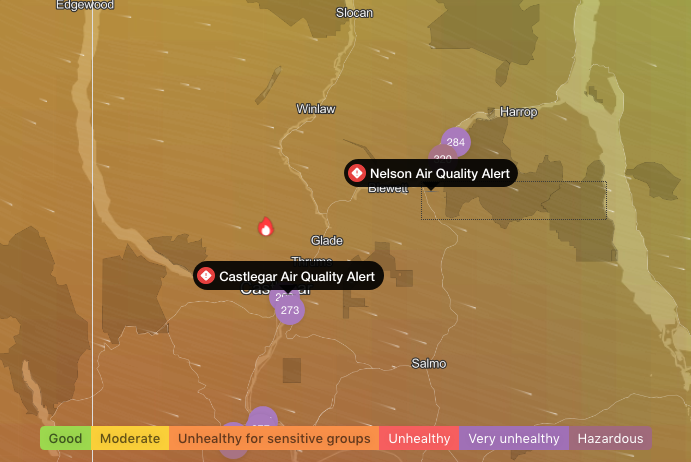Nelson, RDCK lead nation in worst air quality as wildfire smoke chokes the skies
The mantle of worst air quality in the nation has settled on the regional district and Nelson, according to an international air quality technology company.
The Swiss-based IQAir (https://www.iqair.com/ca/canada) has positioned the Regional District of Central Kootenay (320) and Nelson (284) — beating last year’s nationwide mark of 241 — at the top of their real-time most polluted city ranking for Canada due to the degree of smoke accumulating from burning wildfires in the West Kootenay. A quality index between 201 and 300 is considered very unhealthy and a health alert.
Nelson’s ranking is matched by Rossland at 284, with a Trail (282) and Castlegar (273) rounding out the top five in the nation, a West Kootenay sweep.
The air quality proclamation was supported by Environment and Natural Resources Canada — with a rating of 10 on Wednesday, a high health risk — and prompted them to issue a smoky skies bulletin Wednesday morning for the Southeast Fire Centre region, noting that the area will continue to be impacted by extreme wildfire smoke over the next two days.
And for those living in the West Kootenay who have stepped outside over the last few days, in addition to smoke (and fire) they will have to contend with severe hot and dry weather through the weekend.
Due to a “strengthening ridge of high pressure over the southern interior” there will be a boost to daytime high temperatures into the high 30’s Celsius, with overnight lows in the high teens.
Hot times
According to Environment Canada, as the weather grows even hotter people should watch for the effects of heat illness: swelling, rash, cramps. fainting, heat exhaustion, heat stroke and the worsening of some health conditions.
“The risks are greater for young children, pregnant women, older adults, people with chronic illnesses and people working or exercising outdoors,” the advisory cautioned.
People are advised to drink plenty of water before thirst sets in and, if possible, stay in a cool place.
Smoky times
Normally the West Kootenay air is clear and pure but the current smoke-infused version carries some degree of health risk.
Smoky air includes many chemicals that can harm health with a constantly-changing mixture of particles and gasses.
Some people could be adversely affected by the heavy smoke and could be challenged by symptoms such as increased coughing, throat irritation, headaches or shortness of breath. For people who are already compromised with cardiovascular or lung disease — such as asthma — and the lungs of the very young or old, the risk is greater.

From a provincial and IHA bulletin:
During smoky conditions:
• Stop or reduce your activity level if breathing becomes uncomfortable or you feel unwell;
• Stay cool and drink plenty of fluids;
• If you have asthma or other chronic illness, carry any rescue (fast-acting) medications with you at all times and activate your personal care plan that has been designed with your family physician; and
• Make sure that children and others who cannot care for themselves follow the same advice.
Monitor your symptoms:
• People respond differently to smoke. Mild irritation and discomfort are common, and usually disappear when the smoke clears;
• If you are unsure whether you need medical care, call HealthLink BC at 8-1-1; and
• If you are experiencing difficulty in breathing, chest pain or discomfort, or a severe cough, contact your health care provider, walk-in clinic or emergency department.
Tips to reduce your smoke exposure:
• Smoke levels may be lower indoors but will still be elevated, so stay aware of your symptoms even when you are indoors;
• Running a commercially available HEPA (high efficiency particulate air) filter can improve indoor air quality in the room where the device is located;
• If you have a forced air heating/cooling system in your home, it may help to change the filter and set the fan to run continuously; and
• Reduce indoor air pollution sources such as smoking, burning incense and frying foods;
• If travelling in a car with air conditioning, keep the windows up and the ventilation set to recirculate.
Source:https://www2.gov.bc.ca/gov/content/environment/air-land-water/air/air-quality/air-advisories


























Comments